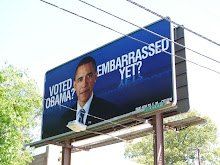The most liberal city by the bay San Francisco has managed to figure out another way to break the Law, citing the city's immigrant sanctuary status. You're not going hear any protest from OBama who favors immigrant sanctuary cities throughout the United States if you really want to know how your country will run once obama is elected then just look too San Francisco.
Feds probe S.F.'s migrant-offender shield
Jaxon Van Derbeken, Chronicle Staff Writer
Sunday, June 29, 2008
San Francisco juvenile probation officials - citing the city's immigrant sanctuary status - are protecting Honduran youths caught dealing crack cocaine from possible federal deportation and have given some offenders a city-paid flight home with carte blanche to return.
The city's practices recently prompted a federal criminal investigation into whether San Francisco has been systematically circumventing U.S. immigration law, according to officials with knowledge of the matter.
City officials say they are trying to balance their obligations under federal and state law with local court orders and San Francisco's policies aimed at protecting the rights of the young immigrants, who they say are often victims of exploitation.
Federal authorities counter that drug kingpins are indeed exploiting the immigrants, but that the city's stance allows them to get away with "gaming the system."
San Francisco juvenile authorities have been grappling for several years with an influx of young Honduran immigrants dealing crack in the Mission District and Tenderloin.
Those who are arrested routinely say they are minors, but police suspect that many are actually adults, living communally in Oakland and other cities at the behest of drug traffickers who claim to be their relatives.
Nonetheless, city authorities have typically accepted the suspects' stories and handled the cases in Juvenile Court, where proceedings are often shielded from public scrutiny.
Unorthodox strategy
Barred by state law from sending drug offenders to the California Youth Authority and bound by a 1989 city law defining San Francisco as a sanctuary city for immigrants - meaning officials do not cooperate with federal immigration investigations - juvenile officials settled on an unorthodox strategy.
Rather than have the drug offenders deported, they have recommended that Juvenile Court judges and commissioners approve city-paid flights home to Honduras for the offenders with the aim of reuniting them with their families.
The practice, federal authorities say, does nothing to prevent offenders from coming back, while federal deportation legally bars them from ever returning. Federal officials also say U.S. law prohibits helping an illegal immigrant to cross the border, even if it is to return home.
Federal officials recently detained a San Francisco juvenile probation officer at the Houston airport, where he was accompanying two Honduran juvenile drug offenders about to board a flight to Tegucigalpa.
They questioned him for several hours before letting him go, and seized the youths and deported them.
"Our job is to uphold the nation's immigration laws," said Greg Palmore, spokesman for U.S. Immigration and Customs Enforcement (ICE). "Although San Francisco is a sanctuary city, it's a problem whenever someone attempts to evade the law. ... Our law does not allow us to turn a blind eye to any individual who has come into this country illegally."
Feds 'flabbergasted'
Joseph Russoniello, the U.S. attorney in charge of the San Francisco area, said he was "flabbergasted that the taxpayers' money was being spent for the purpose of ferrying detainees home. You have to have a perfect storm of dumb moves to have it happen."
William Siffermann, chief of San Francisco's Juvenile Probation Department, said federal agents have never specifically told his office not to send immigrants back to their home countries, but that he has stopped the practice until differences between the city and immigration authorities are resolved.
He said the city's stance is that it does not have to report illegal immigrant minors to the federal government, even if they are found in Juvenile Court to have committed a crime.
"We are not obligated to," he said. "We are abiding by the sanctuary city ordinance."
Siffermann added, "I don't believe we've done anything wrong." But he stressed that his office wants to make sure it is fulfilling its duties "in all arenas, with federal statutes, state statutes and the sanctuary city law."
Juveniles with beards
San Francisco police doubt that many of the young Hondurans they arrest on drug charges are even juveniles.
Police can report suspected adult illegal immigrants to federal authorities if they commit a crime, said Capt. Tim Hettrich, until recently the head of the narcotics unit.
So immigrant drug dealers "pass themselves off as juveniles, with a three-day growth of beard and everything else. It's frustrating," he said.
"Some of them have been arrested four or five times," Hettrich said. "That is one of the big problems with being a city of sanctuary."
He scoffed at San Francisco's strategy of returning the offenders to their home country. "They probably get the round trip and the next day, they will be right back here," Hettrich said.
Patricia Lee, head of the San Francisco public defender's juvenile branch, would not comment on pending cases. But, she said, "a lot of the young people have suffered a lot of abuse, abandonment and neglect in their native country and have been used as (drug-running) mules. There is lot of victimization and trafficking of these young people."
'Gaming the system'
Russoniello said the drug dealers are being sent here as part of an effort that takes advantage of San Francisco's leniency.
"What we're facing is a number of people gaming the system," he said. "Sooner or later the city will realize the advantage to cooperating (with federal authorities), whether it's the threat of criminal prosecution ... or some other method."
Russoniello would not confirm or deny the existence of a federal investigation, but juvenile probation officers connected to the case have been interviewed by federal agents about the flights.
City officials will not say how many juvenile drug offenders have been flown out of the country in recent years or how much the city has spent on the effort.
Federal immigration authorities stumbled on to the effort when they caught several illegal immigrants in December at the airport in Houston, along with a San Francisco juvenile probation officer.
The officer was on hand to make sure the immigrants boarded a plane to Tegucigalpa.
Federal authorities say they met with Siffermann and told him that any juvenile offender had to be handed over to immigration officials after completing his sentence.
The Immigrations and Customs Enforcement agency sent a letter to Siffermann on Dec. 17 stressing that it would soon "like to begin receiving referrals" about immigrant juveniles in custody in the city.
"The red flag was flown," Russoniello said.
City saw it differently
Siffermann, however, said federal authorities were not exactly clear about what the city could and could not do related to the flights or the status of immigrants held in juvenile cases.
"They did a little friendly stop-by," Siffermann said. "They said, 'This is something we would like you to cooperate on.' ... They said, 'Hey, look, this could be contrary to federal law, you might be in violation.' "
Meanwhile, the flights continued.
On May 15, two more illegal immigrants from Honduras were arrested in Houston, again accompanied by a San Francisco juvenile probation officer. Federal immigration authorities held the officer for more than three hours before releasing him.
Six days later, there was another meeting, Siffermann said. This time it was with a representative of Russoniello's office.
After that, Siffermann put the flights on hold. "We will look for other (approaches) for them," he said.
Siffermann stressed that the city ships out juvenile offenders to their home countries only after all other rehabilitative efforts have failed, including probation, foster care and juvenile detention.
The strategy is appropriate, Siffermann said, because deporting young offenders would doom them from ever becoming productive residents of the United States.
"It might prevent them from obtaining citizenship," he said, denying them a chance to "take a different course."
In a statement released by the city attorney's office, which is advising the city on the issue, spokesman Matt Dorsey said, "We've been in ongoing contact with the U.S. attorney's office on this, and we've informed them of our intention to address these issues in court proceedings.
"We're looking at the legal issues carefully and methodically," Dorsey's statement said, "and we're in the process of advising our client, the Juvenile Probation Department."
He said his office was not aware of the practice of flying juveniles back to Honduras.
Stranded juveniles
A recent count showed 22 of the 125 minors in custody at juvenile hall were immigrants and had no legal guardians in the United States, Siffermann said. He said his office is trying to figure out what to do with them now that flights are no longer an option.
Russoniello said the city has no choice but to comply with U.S. law and turn the youths over to federal authorities. "The alternative, now that they are all on notice, is a period of prolonged darkness," he said.
Judge Donna Hitchens, who oversees the city's Juvenile Court, said the original idea for flying youths home came from juvenile probation officials, and that it is up to them, not judges, to work out their differences with the federal government."We are only the judicial branch," she said. "The issue is between the city and ICE."
Another President Obama Solar Firm goes Bankrupt Fed energy loan $400
million
-
WASHINGTON - A Colorado-based solar panel maker that received a $400
million loan guarantee from the Obama administration said Thursday it will
file for ba...
11 years ago





















